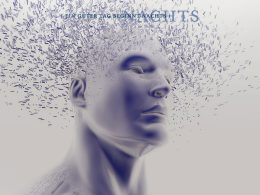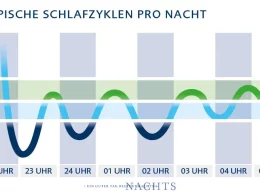Many parents are familiar with this scenario. One moment, their child is sleeping peacefully and contentedly, and the next, they are screaming in panic, kicking and lashing out, and cannot be calmed down. And just as suddenly as it came, the nightmare is over and the child is asleep again. This phenomenon is known as night terrors – also called pavor nocturnus, which means “night fear” in Latin. It is a sleep disorder that occurs mainly in early childhood and can be extremely frightening for parents. But what exactly is a night terror? Where does it come from and how should parents best respond when their child is affected by it?
How does a night terror manifest itself?
Pavor nocturnus usually occurs within the first one to four hours after falling asleep, always during the dreamless non-REM phases. The child wakes up with a loud sob or scream, is disoriented, does not respond when spoken to, and kicks and lashes out violently. They are often drenched in sweat and have an extremely rapid pulse. Their eyes may be open, but their gaze is blank. The night terror can be over after just a few minutes – but sometimes it lasts up to 45 minutes.
Who is affected by night terrors?
Night terrors are particularly common in young children between the ages of two and six. So-called baby night terrors are also known, although they are less common in infants and often milder. With increasing age, schoolchildren can also be affected – usually between the ages of seven and twelve – before the episodes disappear on their own during puberty. Some children experience this sleep disorder only a few times in their lives, while others experience it more frequently at certain ages.
Approximately 3 to 6 out of 100 children are affected by night terrors at least once during their childhood. Night terrors are more common in boys than in girls. Genetic factors also seem to play a role: if night terrors or sleepwalking already occur in the family, the risk for children increases. Often, both phenomena occur together – children with night terrors often also show signs of sleepwalking. For more information on sleepwalking, see our article Sleepwalking – being active in your sleep. Incidentally, adults are only affected in exceptional cases – this is referred to as unusually persistent pavor nocturnus.
Parents can rest assured: even if the episodes seem dramatic to outsiders, night terrors are a temporary phenomenon. They do not impair the child’s development and disappear on their own over time.
Nightmare or night terror?
Unlike nightmares, which children can remember vividly and fearfully even after waking up and for which they seek comfort from their parents during the night, there is no memory of night terrors the next day. This difference applies regardless of age – babies, toddlers, and older children who suffer from night terrors do not remember what happened. This is an important distinguishing feature for parents in particular, as it clearly differentiates night terrors from nightmares.
Another difference is the time of day: nightmares typically occur much later in the night, usually after midnight during the dream-intensive REM phase. In addition, nightmares can affect children and adults alike, while night terrors occur almost exclusively in childhood.
If you would like to learn more about bad dreams and their meaning, we recommend our article Nightmare – when the dream scares you.
What causes night terrors?
The exact cause of night terrors is still unclear. Experts believe that the central nervous system, which is not yet fully developed in children, plays a key role and overreacts in certain situations. In babies, the immature nervous system in combination with developmental spurts is considered to be the main trigger. In toddlers, however, stress, overtiredness, or an irregular sleep pattern are more common causes.
Other contributing factors include impressions and experiences during the day, infections, lack of sleep, or emotional stress. Children who are particularly sensitive or have a vivid imagination also seem to be affected more often. In addition, there are external influences such as unfamiliar surroundings, going to bed too late, or exciting media content shortly before bedtime. In some cases, fever or certain medications can also trigger night terrors.
As a rule, pavor nocturnus is harmless. However, there are situations in which medical advice is advisable: for example, if the episodes occur very frequently or last unusually long, if the child injures themselves or appears severely exhausted during the day. A pediatrician or sleep medicine specialist can then clarify possible causes and provide targeted support to the family.
What to do in the event of a night terror?
As frightening as night terrors may be for parents – whether they occur in babies, toddlers, or school-age children – the most important thing is to remain calm. It can be helpful to speak quietly and soothingly to the child and to make sure that they cannot hurt themselves by kicking or hitting. Holding them down or even waking them up should be avoided at all costs, as this will only increase their fear. In most cases, night terrors pass on their own – often as suddenly as they came.
Night terrors affect not only the child, but the entire family. For parents, they are often associated with great concern, lack of sleep, and feelings of helplessness. It is therefore important to realize that night terrors do not pose a danger to the child, even if they look frightening. In most cases, the episodes disappear on their own as the child gets older. Talking to other families or finding small moments of calm in everyday life can also provide additional relief for parents.
How can you prevent a night terror?
With healthy sleep hygiene – i.e., regular bedtimes, a consistent and calm bedtime routine, a cozy atmosphere in the child’s bedroom, and children’s bedding – night terrors can definitely be prevented. It is also advisable not to overfill children’s days with appointments and to ensure that they have sufficient rest and relaxation periods during the day.
Television and computer games should be avoided immediately before bedtime. An evening conversation between parents and child about the day’s experiences can also be helpful and ensure peaceful and restful nights.
The right furnishings in the children’s room also help to promote peaceful and restful nights. We therefore recommend the following children’s bedding:
The NENA® flat pillow is specially designed for children who should lie flat in their first years of life. The 100% goose down filling makes it cozy and soft, while the cotton batiste cover ensures a comfortable, moisture-regulating sleeping environment. Washable up to 60°C and developed by the billerbeck Foundation for Sleep and Health® – for safe and child-friendly sleeping comfort.
The NENA® children’s duvet offers heavenly sleeping comfort thanks to 100% goose down and a fine cotton batiste cover. It is available in different sizes and warmth levels to suit your child’s individual needs. Cuddly soft, moisture-friendly and also washable at up to 60°C – ideal for restful nights and a healthy, comfortable climate.














